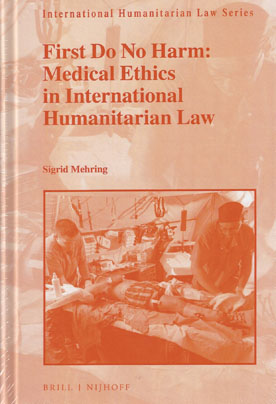
Although working on the sidelines of armed conflicts, physicians are often at the centre of attention. First do no harm: Medical Ethics in International Humanitarian Law was born from the occasionally controversial role of physicians in recent armed conflicts and the legal and ethical rules that frame their actions.
While international humanitarian, human rights and criminal law provide a framework of rights and obligations that bind physicians in armed conflicts, the reference to ‘medical ethics’ in the laws of armed conflict adds an extra-legal layer.
In analysing both the legal and the ethical framework for physicians in armed conflict, the book is invaluable to practitioners and legal scholars alike.